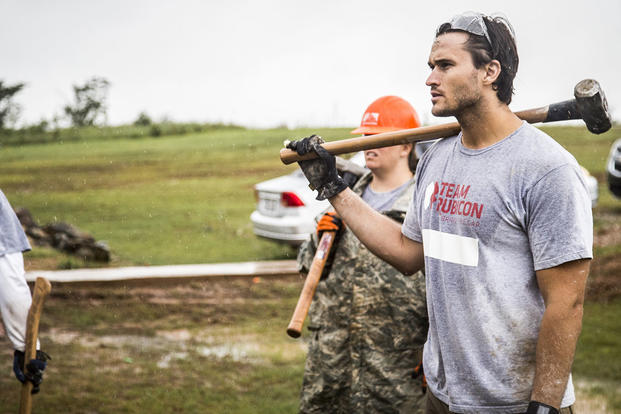Veterans Day is a day set aside to pay tribute to the service and sacrifice of our nation's military service members. It is a day riddled with obligatory "Thank you for your service" statements, most genuine, some less so.
I would encourage you today to thank the veterans you meet for their service. After all, in today's military, each and every one of them volunteered to put themselves in harm's way. That should not go unnoticed.
But America should move beyond trite words of thanks and into a deeper conversation about what it means to be a veteran in today's world -- or yesterday's, for that matter. With less than 1% of the nation having served in the military since 9-11, the divide between civilians and the military is perhaps at its widest ever.
The health of our all-volunteer force rests on our nation's ability to understand what life in the military and at war entails. A poor understanding leads to poor policy decisions, both during peace and during war. A healthy understanding leads to a more informed discussion on defense policy and better opportunities for those volunteers as they inevitably transition out and begin their civilian lives.
So why does America hesitate to ask its young warriors about their experience in the military? The argument I most often hear is that civilians assume veterans will not want to share their sacred memories and experiences with someone who "hasn't been there."
In my opinion, this is simply not the case. Veterans are eager to share their stories with civilian counterparts. They are immensely proud of their accomplishments and want to dispel myths surrounding the uniform. You'll quickly find that most veterans seek common ground with civilians, and common ground requires mutual understanding -- as much of your background as theirs.
The second thing I hear civilians say is that war makes them uncomfortable, and they'd prefer not to listen to tales of it. Two quick points -- first, the vast majority of veterans you encounter will not have seen "war" as you imagine it. Most deployed troops serve perfectly mundane, albeit essential, functions overseas. So that Army veteran you fear is going to unleash tales of Rambo-heroism is much more likely to tell you how she maintained a complex IT network at Bagram Air Base. Of course, she might describe how that network had to withstand unimaginable desert conditions, and how the occasional mortar round made the heart jump ... or that the hardest thing was missing her son's kindergarten graduation while she was away.
Second point -- tough shit. War makes you uncomfortable? Well, throwing a tourniquet on your buddy's bloody stump after he steps on a landmine is uncomfortable. And although you, John Doe civilian, did not personally authorize our military to enter Iraq and Afghanistan, as the citizen of a democracy, you share the burden of our wars. Or at least you should, and that's exactly why you should take a veteran out to coffee and demonstrate that you truly care about his or her experience.
As a public veteran advocate, I find myself repeatedly thanked for my service after I give talks at universities and corporations. I never treat those thank you's negatively; I appreciate them, although they sometimes make me uncomfortable. But what I'm really looking for is understanding. It is my personal (non-scientific) belief that the predominant driver of mental injury in veterans is moral in nature. In order for a young man or woman to make sense of the actions they took overseas, of the loss they suffered and the pain they observed or inflicted, they must feel emotionally and morally unified with their fellow citizens. If they feel pain at the loss of their brother, or guilt over the life they had to take, they want you to feel it, too. "Thank you" does no better at easing such pain and guilt than does a disability payment from the VA. True healing comes when the burden is spread from the 2.5 million that shouldered it to the 300 million that placed it upon them.
This Veterans Day, escape your comfort zone. Find a veteran and thank them. Then put your arm around them and ask to hear their story. Perhaps we'll begin to heal together.
Where do you start?
Join these great organizations to get out and meet some veterans:
Read these books:
- "For Love of Country" by Howard Schultz and Rajiv Chandrasekaran
- "Thank You for Your Service" by David Finkel
- "What It Is Like to Go to War" by Karl Marlantes
Hire a veteran:
Jake Wood is the co-founder and CEO of Team Rubicon, a nationwide nonprofit that provides military veterans with the opportunity to continue their service by responding to natural disasters and global crises. As a leading veteran advocate, Wood is also the co-founder of POS REP, the first mobile, proximity-based social network designed exclusively for the veteran community. Prior to Team Rubicon, Jake served as a sergeant in the United States Marine Corps, with deployments to Iraq and Afghanistan as a scout sniper. Jake's first book on leadership, Take Command is available on Amazon. You can follow Jake or Team Rubicon at: @teamrubicon and @jakewoodTr
Find the Right Veteran Job
Whether you want to polish your resume, find veteran job fairs in your area or connect with employers looking to hire veterans, Military.com can help. Subscribe to Military.com to have job postings, guides and advice, and more delivered directly to your inbox.















